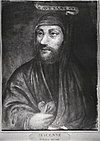
Back برهان الصديقين Arabic Prueba de la veracidad Spanish Burhan ash-Shiddiqin ID Argument nužnog bića Serbo-Croatian De sanningsenligas bevis Swedish

 |
| Part of a series on |
| Avicenna (Ibn Sīnā) |
|---|
| Works |
| Thoughts |
| Pupils |
| Monuments |
| Part of a series on the |
| Philosophy of religion |
|---|
| Philosophy of religion article index |
The Proof of the Truthful[1] (Arabic: برهان الصديقين, romanized: burhān al-ṣiddīqīn,[2] also translated Demonstration of the Truthful[2] or Proof of the Veracious,[3] among others) is a formal argument for proving the existence of God introduced by the Islamic philosopher Avicenna (also known as Ibn Sina, 980–1037). Avicenna argued that there must be a "necessary existent" (Arabic: واجب الوجود, romanized: wājib al-wujūd), an entity that cannot not exist.[4] The argument says that the entire set of contingent things must have a cause that is not contingent because otherwise it would be included in the set. Furthermore, through a series of arguments, he derived that the necessary existent must have attributes that he identified with God in Islam, including unity, simplicity, immateriality, intellect, power, generosity, and goodness.[5]
Historian of philosophy Peter Adamson called the argument one of the most influential medieval arguments for God's existence, and Avicenna's biggest contribution to the history of philosophy.[4] It was enthusiastically received and repeated (sometimes with modification) by later philosophers, including generations of Muslim philosophers, Western Christian philosophers such as Thomas Aquinas and Duns Scotus, and Jewish philosophers such as Maimonides.
Critics of the argument include Averroes, who objected to its methodology, Al-Ghazali, who disagreed with its characterization of God, and modern critics who state that its piecemeal derivation of God's attributes allows people to accept parts of the argument but still reject God's existence. There is no consensus among modern scholars on the classification of the argument; some say that it is ontological while others say it is cosmological.[6]
- ^ Inati 2014, p. 28.
- ^ a b Adamson 2016, p. 126.
- ^ Rizvi 2009.
- ^ a b Adamson 2013, p. 170.
- ^ Adamson 2013, p. 171.
- ^ Mayer 2001, pp. 18–19.
© MMXXIII Rich X Search. We shall prevail. All rights reserved. Rich X Search